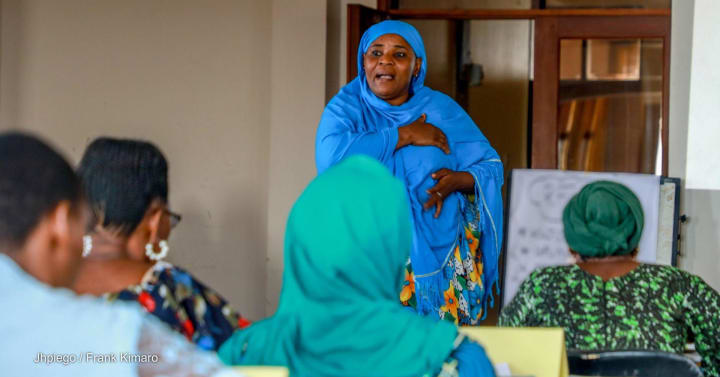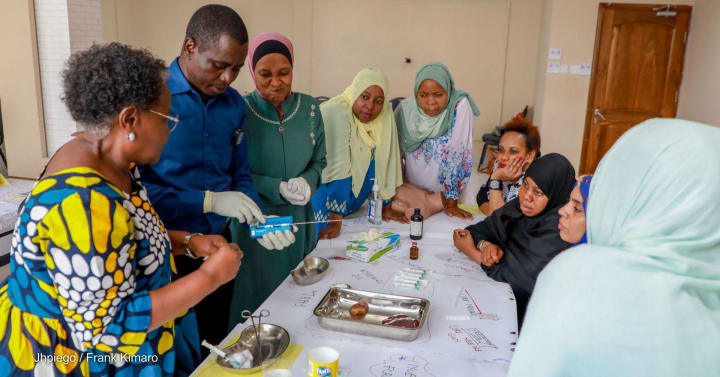
Globally, breast cancer is the leading cause of cancer death among women, and those who live in low-income and lower-middle-income countries face the steepest odds of survival in part due to limited access to sufficient screening as well as diagnostic and treatment services, often delaying accurate diagnosis and care. This can be further compounded by outdated or nonexistent national cancer control plans or necessary prioritization within national health agendas.
“When you consider the burden of breast cancer in Tanzania, approximately 90% of women are diagnosed with advanced stages of the disease, contributing to potential avoidable loss of life,” Darren Back, executive director of The Pfizer Foundation, told Devex. “Compare this to high-income countries where the five-year survival rate of women with breast cancer exceeds 90%, it highlights the significant inequity in access to timely and quality health services.”
The need to expand early screening and diagnostic capacity was one of the focal points of a recent technical roundtable The Pfizer Foundation convened in partnership with international health nonprofit Jhpiego and the Tanzania Ministry of Health to identify opportunities for cross-sector collaboration and other potential solutions to help improve breast cancer care efforts in Tanzania.
The discussion was part of Action & Impact: A Cancer Care Initiative by The Pfizer Foundation, which aims to reduce inequities in cancer care. Through a recent $15 million investment, the initiative is supporting efforts led by Jhpiego and Partners In Health to expand breast cancer screening and help ensure more timely access to diagnosis and treatment in Rwanda, Ghana, and Tanzania.
“Our mission is to help build healthier communities around the world, which we achieve by investing in community-led partnerships and solutions that aim to address some of today's most complex health challenges, such as the stark disparity in access to timely breast cancer care in countries such as Tanzania,” Back said.
Following the roundtable, Back shared his thoughts on some of the insights that emerged from the discussion, the importance of cross-sector collaboration, and more.
This conversation has been edited for length and clarity.
What were some of the main takeaways from the technical roundtable?
First, it’s great to see that the Tanzanian government is using the WHO Global Breast Cancer Initiative framework in terms of how they assess and prioritize barriers for [addressing] breast cancer care. These are centered on the 60-60-80 targets set by WHO — where 60% of women who present with invasive cancer should be in Stage 1 or 2, have their confirmatory diagnosis within 60 days, and 80% should undergo and complete a multimodal treatment regimen.
We also discussed health care financing, particularly its importance for program sustainability, and the role of technology and innovation in closing health access gaps. Specifically, how AI can help overcome some of the barriers women face when seeking breast cancer care.
What other solutions emerged that can help address barriers to breast cancer care in Tanzania? What is their applicability to other countries?
One possible solution discussed was the need to prioritize patient-centered care pathways to help ensure women can access treatment when and where they need it. After the roundtable, I had the opportunity to visit Nyamagana District Hospital in northern Tanzania’s Mwanza region, where they’ve created something akin to a “one-stop shop” for women to have their clinical breast exam and receive diagnostic services and disease education all on the same day and at the same facility if there is a suspected abnormality. It’s a great example of how patient-centered care pathways can help limit the risk of loss to follow-up.
We also talked about innovative financing models and thinking differently about how the government and providers could help ensure the long-term sustainability of breast cancer care in Tanzania. This could range from expanded National Health Insurance Plans, public-private partnerships, and looking to development banks, but also some creative ideas, such as a sin tax or lotteries that could be implemented to raise funds for improving breast cancer services.
Many of the potential solutions we discussed could be applied to countries facing similar barriers, which emphasizes the importance of sharing insights. As such, we’re actively working to catalog these learnings, not just from our partnership in Tanzania but from other countries we’re supporting through The Pfizer Foundation’s Action & Impact initiative, which currently includes Rwanda and Ghana.
How do collaborations like this roundtable align with The Pfizer Foundation’s mission?
Our mission is centered on our belief that the most effective health solutions often come from those who are closest to the challenge in the community. This roundtable was a perfect example of that belief, as we were able to bring together local leaders, experts, and partners, all of whom have deep roots and connections to the community. It emphasized how we aim to collaborate and support locally-led and -driven health innovations.

How might your partnership with Jhpiego serve as a model for future collaborative efforts to address barriers to breast cancer care in Tanzania and other countries in sub-Saharan Africa?
Addressing inequalities in care requires more than just medical advances; it takes cross-sector collaboration from the entire global health community.
In terms of our partnership with Jhpiego, we’re working to foster innovation, build local capacity, and make sure that best practice is not only shared but [also] adapted to meet unique community needs in Tanzania and beyond. We also know that no single donor, foundation, or government can achieve these advancements alone. The Pfizer Foundation is committed to continue investing in efforts like these, where we can bring together diverse perspectives and align with local and national health priorities.
Over the course of your nearly 15 years with Pfizer and The Pfizer Foundation, you have had a window into the evolution of the global health landscape. What progress have you seen in enabling more equitable access to care, and what is the role of philanthropy?
More and more countries are prioritizing equitable access to quality health care. But there’s a growing recognition that approaches to address breast cancer and other diseases cannot always be one-size-fits-all. We’ve seen this shift from what historically was more of the top-down model to one that aims to be more inclusive, locally driven, and responsive to specific community needs.
There’s still a long way to go, and today’s challenges can seem even bigger and more daunting than ever. But all that said, I’ve always been a big believer in the power of philanthropy, because it continues to play a crucial role in advancing global health — especially in the more complex environment we are experiencing right now.
What is your call to action for the broader global health community as it relates to improving access to breast cancer care?
The first is to center community-driven solutions and work together with communities rather than around them. We need to understand the nuances of the patient journey and address those context-specific barriers — such as appropriate awareness and education — in ways that are specifically tailored to those communities and their needs. And, ultimately, with community support, we need to invest more in health promotion and early breast cancer detection programs.
Second, we must work together to identify opportunities for new and innovative multisectoral collaborations. This can be with governments, NGOs, development banks, the private sector, advocates, and others. We need to leverage what we each do best because it’s the only way that we can create a more meaningful and sustainable impact that ultimately improves the outlook for those impacted by breast cancer.
The Pfizer Foundation is a charitable organization established by Pfizer Inc. and is a separate legal entity with distinct legal restrictions. To learn more about The Pfizer Foundation, click here.




